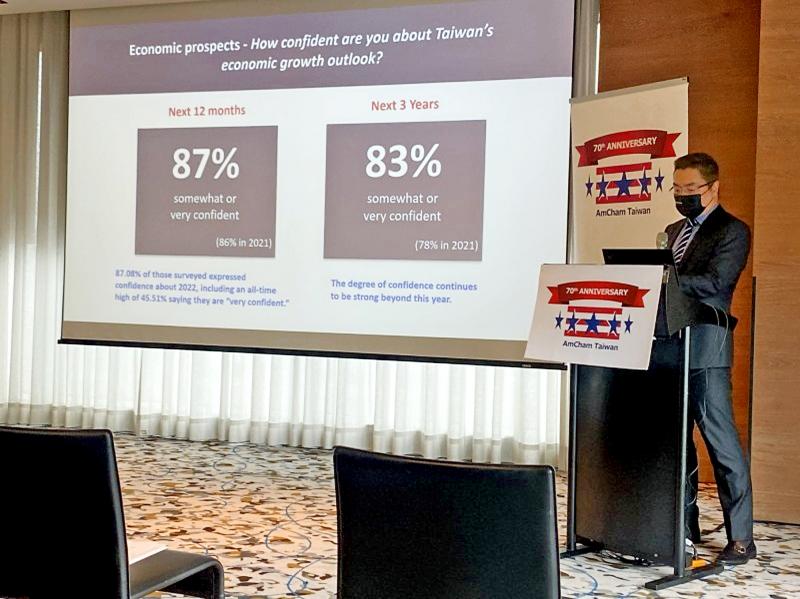A record 90 percent of US companies in Taiwan expect revenue growth this year, while many want the government to prioritize energy issues to ensure sufficient supply and stable voltage, the American Chamber of Commerce in Taiwan (AmCham) said yesterday.
While last year was challenging for the global economy, Taiwan demonstrated its resilience with an impressive economic performance, the chamber of 1,050 members from 500 international companies said in a survey it conducted last month and this month.
GDP growth is likely to fare well again this year, as demand for Taiwanese exports remains sturdy, it said.

Photo: Huang Pei-chun, Taipei Times
Consistent with this trend, the annual business climate survey indicated high levels of optimism among member companies regarding the economic outlook.
Among the respondents, more than 87 percent expressed confidence in Taiwan’s economic growth over the next 12 months, while 83 percent were positive about the outlook over the next three years, the AmCham said.
Taiwan’s stable economy has prompted a record 90 percent of members to indicate confidence in their revenue growth prospects over the next 12 months, with 91 percent confident over a three-year span, it said.
Sixty-one percent said that President Tsai Ing-wen (蔡英文) should give top priority to the energy issue, followed by COVID-19 pandemic control (46 percent), cross-strait relations (42 percent), and trade agreements with the US and other partners (42 percent), the survey showed.
On the energy front, a majority voiced concern over power supply, voltage stability, the cost of electricity and progress toward green energy, with the degree of concern rising by double percentage points from a year earlier, it said.
Grid resiliency — a response item added this year — was a concern for 71 percent, it said.
Nearly 80 percent of respondents cited at some impact on operations from increased US-China competition, with more than 42 percent calling the effects positive.
As for economic accords, more than 65 percent supported the negotiation of a bilateral trade agreement with the US, while 62 percent backed Taiwan’s admission to the Comprehensive and Progressive Agreement for Trans-Pacific Partnership, the survey showed.
It said that 95 percent of respondents expected Taiwan’s bilingual policy to benefit economic development, but some doubted that the goal is achievable by 2030.

CHAOS: Iranians took to the streets playing celebratory music after reports of Khamenei’s death on Saturday, while mourners also gathered in Tehran yesterday Iranian Supreme Leader Ayatollah Ali Khamenei was killed in a major attack on Iran launched by Israel and the US, throwing the future of the Islamic republic into doubt and raising the risk of regional instability. Iranian state television and the state-run IRNA news agency announced the 86-year-old’s death early yesterday. US President Donald Trump said it gave Iranians their “greatest chance” to “take back” their country. The announcements came after a joint US and Israeli aerial bombardment that targeted Iranian military and governmental sites. Trump said the “heavy and pinpoint bombing” would continue through the week or as long

TRUST: The KMT said it respected the US’ timing and considerations, and hoped it would continue to honor its commitments to helping Taiwan bolster its defenses and deterrence US President Donald Trump is delaying a multibillion-dollar arms sale to Taiwan to ensure his visit to Beijing is successful, a New York Times report said. The weapons sales package has stalled in the US Department of State, the report said, citing US officials it did not identify. The White House has told agencies not to push forward ahead of Trump’s meeting with Chinese President Xi Jinping (習近平), it said. The two last month held a phone call to discuss trade and geopolitical flashpoints ahead of the summit. Xi raised the Taiwan issue and urged the US to handle arms sales to

BIG SPENDERS: Foreign investors bought the most Taiwan equities since 2005, signaling confidence that an AI boom would continue to benefit chipmakers Taiwan Semiconductor Manufacturing Co’s (TSMC, 台積電) market capitalization swelled to US$2 trillion for the first time following a 4.25 percent rally in its American depositary receipts (ADR) overnight, putting the world’s biggest contract chipmaker sixth on the list of the world’s biggest companies by market capitalization, just behind Amazon.com Inc. The site CompaniesMarketcap.com ranked TSMC ahead of Saudi Aramco and Meta Platforms Inc. The Taiwanese company’s ADRs on Tuesday surged to US$385.75 on the New York Stock Exchange, as strong demand for artificial intelligence (AI) applications led to chip supply constraints and boost revenue growth to record-breaking levels. Each TSMC ADR represents

Pro-democracy media tycoon Jimmy Lai’s (黎智英) fraud conviction and prison sentence were yesterday overturned by a Hong Kong court, in a surprise legal decision that comes soon after Lai was jailed for 20 years on a separate national security charge. Judges Jeremy Poon (潘兆初), Anthea Pang (彭寶琴) and Derek Pang (彭偉昌) said in the judgement that they allowed the appeal from Lai, and another defendant in the case, to proceed, as a lower court judge had “erred.” “The Court of Appeal gave them leave to appeal against their conviction, allowed their appeals, quashed the convictions and set aside the sentences,” the judges